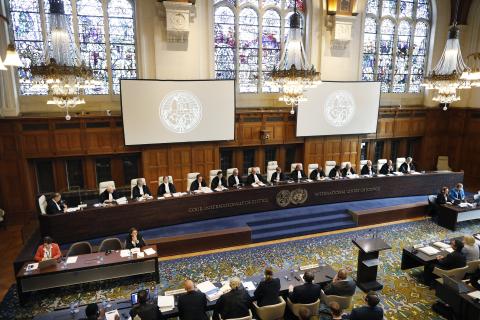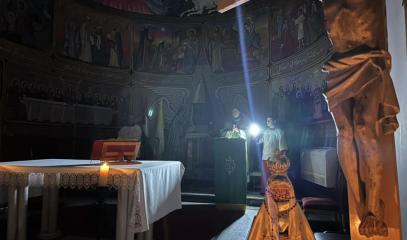Pro-peace rabbi 'disappointed' by the ICJ’s failure to order a ceasefire in Gaza
Jeremy Milgrom slams the International Court of Justice for not ordering an end to the fighting. Instead, the UN tribunal chose to call on Israel to take measures to spare further deaths and on Hamas to release the hostages. Israeli Prime Minister Netanyahu and his right-wing ultraorthodox ministers slam the ruling, while the Palestinians welcome it.
Jerusalem (AsiaNews) – The International Court of Justice (ICJ) has issued its first ruling in the proceedings brought by South Africa against Israel over its war in Gaza.
"I regret the failure to impose a ceasefire" in Gaza, which "would have saved many more Palestinian and Israeli lives,” said Jeremy Milgrom, Israeli rabbi and member of the NGO Rabbis for Human Rights, speaking to AsiaNews.
A "terrible" situation "continues" and today's decision will not stop it. "Innocent people are suffering and there is no justification" other than the one used "by [Benjamin] Netanyahu who wants to pursue the war,” causing “immense suffering in order to escape legal “proceedings against him to “avoid prison.”
The ICJ, called upon to rule on South Africa’s application, ruled today that “Israel must take measures within its power to prevent and punish the direct and public incitement to commit genocide in relation to the members of the Palestinian group," said ICJ President Joan Donoghue.
While not ordering a ceasefire, the court called on Israel to ensure that humanitarian measures are taken, and submit a report to the court within one month of this order. It refused Israel’s request that the case be dismissed, but expressed hope for the unconditional release of all hostages.
Reactions in Israel and Palestine were immediate. Prime Minister Benjamin Netanyahu said that his country had the right to defend itself, while National Security Minister Itamar Ben Gvir described the Court as "anti-Semitic", bent on "the persecution of the Jewish people”.
For Hamas, the decision by the ICJ is an important step to isolate Israel and highlight its crimes in Gaza, while Palestinian Foreign Minister Riyad al Maliki praised the judges, welcoming the provisional measures because they have been “ruled in favour of humanity and international law”.
The Court, 15 permanent members and one each from South Africa and Israel, had to answer two questions: whether South Africa has met the basic test to show that its claim against Israel can be dealt with under the UN's 1948 Genocide Convention; and whether there is a plausible risk of irreparable harm to the Palestinian people in Gaza if Israel's military action continues.
In her opening statement, President Joan Donoghue said that the scope in the case was limited, while stressing that the court was "deeply concerned" about the ongoing loss of life.
She noted that there was sufficient evidence in the dispute because some acts "fall under the genocide convention," which is why the Court denied Israel's request to dismiss the entire case,
Instead, the Court plans to examine whether any of the nine provisional measures demanded by South Africa are justified.
Echoing the words of UN emergency aid coordinator Martin Griffiths, Judge Donoghue said that “Gaza has become a place of death and despair".
Meanwhile, Israel and Hamas have reached a basic deal on many of the terms regarding a ceasefire and the release of the hostages, the Haaretz newspaper reported.
The two agreed on a 35-day period during which all hostages will be released, probably in three or four phases. In exchange, Israel will release Palestinian prisoners and considerably expand humanitarian aid into the Gaza Strip.
The legal proceedings began on 29 December, when South Africa went before ICJ, the United Nations tribunal in charge of settling disputes between states, alleging that Israel was committing “genocide” in Gaza.
Israel rejected the accusation, claiming that its military operation in Gaza was legitimate.
In its application, South Africa requested emergency measures to end the war launched by the Jewish state against Hamas, which controls Gaza, in response to the latter’s attack that killed 1,200 people in Israel and wounded more than 5,000.
In Gaza, the fighting has killed more than 26,000 people, most of them civilians, including women and children. South Africa, which supports the Palestinians, asked the court to issue nine provisional measures, including a halt to military activity by Israel.
In its 84-page legal case, South Africa says that Israel’s actions and omissions are of a “genocidal” nature to eliminate the Palestinian population, in violation of Article II.
It cites senior Israeli officials, including ultra-orthodox and radical right-wing ministers Bezalel Smotrich and Itamar Ben-Gvir, who called for the removal of Gaza’s population.
It also quotes Defence Minister Yoav Gallant who called the Palestinians "human animals" and Jerusalem Heritage Minister Amichai Eliyahu who called for dropping a "nuclear bomb” on Gaza.








.png)










